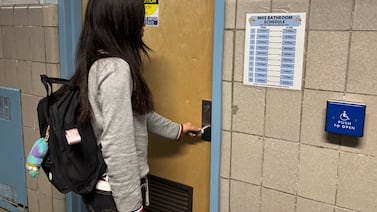Sign up for Chalkbeat Chicago’s free daily newsletter to keep up with the latest news on Chicago Public Schools.
Mayor Brandon Johnson announced Tuesday that Chicago will spend $7 million on increasing salaries for 3,000 early childhood workers, as part of an effort to pay them closer to what their counterparts at K-12 schools earn.
The money will boost wages by 5-10% for a range of staffers whose jobs are funded by state money, including teachers and teacher assistants at dozens of community-based early childhood providers. These providers are part of the city’s early learning system overseen by the Department of Family and Support Services, or DFSS, city officials said.
In addition, workers at Head Start, a federally funded program that serves kids from low-income households, will get a one-time 2% bonus, according to a city press release.
These programs are separate from Chicago Public Schools’ preschool programs, which provide half- and full-day programming for 3- and 4-year-olds at schools.
Many early childhood education providers have struggled to fund their programs and stave off a teacher shortage that they say stems from low wages — especially since federal relief from the pandemic ended. Officials say low pay and high stress are contributing to the teacher shortage in the early childhood field.
Full-time early childhood teachers in Chicago earned roughly $36,000 a year, according to a 2023 state survey. A 2022 study found that Chicago’s early childhood educators are paid on average $18,000 less than elementary school teachers, even if they have the same degree.
Johnson noted that almost 20 years ago, as a new CPS teacher with a master’s degree, he earned close to $45,000.
“It’s time we have salaries that are showing up for the people that are showing up for the families,” Johnson said during a press conference at the North Lawndale YMCA, which is one of at least 86 early childhood providers where workers will receive wage increases.
DFSS uses state and federal funds to provide early childhood education to about 13,000 kids, according to the city press release. The city’s $7 million contribution towards pay raises comes from the city budget’s corporate fund, which is used for basic city services.
Johnson’s announcement came after SEIU Healthcare, a union that represents thousands of early childhood workers in Chicago, pushed the city to address pay parity for their members. The union held town halls and testified to the City Council, according to Brynn Seibert, vice president at SEIU Healthcare Illinois.
Seibert said the next step is to push elected officials to ensure the wage increase “becomes permanent.” The wage increases, which will be implemented by child care agencies, will go into effect after July 1 for one fiscal year. Johnson said he plans to whip up support in the City Council for future raises.
Tahiti Hamer, an early childhood teacher at North Lawndale YMCA and an SEIU union leader, said she’s struggled to financially support her two children with her salary for the past 25 years. While she’s stuck it out, others have left the profession, leaving teachers like her working through their prep time and even struggling to eat lunch or use the bathroom.
“For kids, it means the family’s faces they’re used to seeing every day are gone and there are fewer staff to support them,” Hamer said, “and it is hard for parents, too, who are entrusting us with their children every day … who face a huge burden when classrooms close because there are not enough staff to keep them open.”
Reema Amin is a reporter covering Chicago Public Schools. Contact Reema at ramin@chalkbeat.org.






